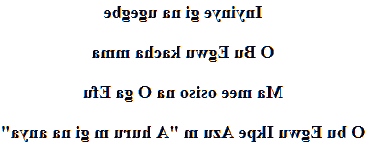Igbo love poem
Ùgègbè
Inyinye gi na ugegbe
O Bu Egwu kacha mma
Ma mee osiso na O ga Efu
O bu Egwu Ikpe Azu m "A huru m gi na anya"


→ French poem ←
Igbo language
(Ịhụnanya uri) Love poem translated into igbo (variations : Ibo, Ebo, Ikwere, Etche, Iika, Unege, Isuama, Mbaise, Ngwa, Nsa, Ohuhu, Oka, Onitsha, Afikpo, Aniocha, Awka, Bonny-Opobo, Eche, Egbema, Orlu, Nsuka, Oguta, Owerri, Umuahia, Unwana).
Igbo is the language of 30 million Ibos (Igbos) in the former Biafra in the south-west of Nigeria, in Igbo country, in the regions of Agbor and Port Harcourt.
Igbo a Benue-Congo language of the Niger-Congolese family is sometimes written with the "Nsibidi" alphabet, but here, its in Latin characters.
I would like to write her sweet face in nsibidi.
The Igbo, which has several dialectal variations (a good dozen), is one of the three major languages of Nigeria, with Yoruba and Hausa.
Of the three, if it is the least taught, it begins to be better studied by linguists, and several universities are beginning to offer it.
The number of these dialects spoken by groups isolated by thick Bush, has led each of these groups to think that they were not a single people.
The colonial period, by bringing them together, made them realize that they shared the same culture and the same language.
The Igbos
The Ibos occupy the ground in a very dense manner; They cultivate manioc, yam and oil palm.
Their socio-political organization was based on, at the same time, Local patrilignages with exogamous tendencies, which conferred to elders an important role within the age classes, and on a supra-village power which drew its power from the slave trade and then from Palm oil; It was united by the earth's worship.
British colonization, suppressing the elders political functions and training the cadres of independent Nigeria, assured the predominance of the Ibos over the other ethnic groups. First fragmented into several groups, it was colonization that made them find their identity and come together.
Today, their society remains patriarchal and they live in independent communities in villages that are patrilineages (Umunna).
Many families have members who have gone abroad, and this diaspora remains attached to its roots. Yams and kola nuts, so important in the Igbo country, remain important anchors.